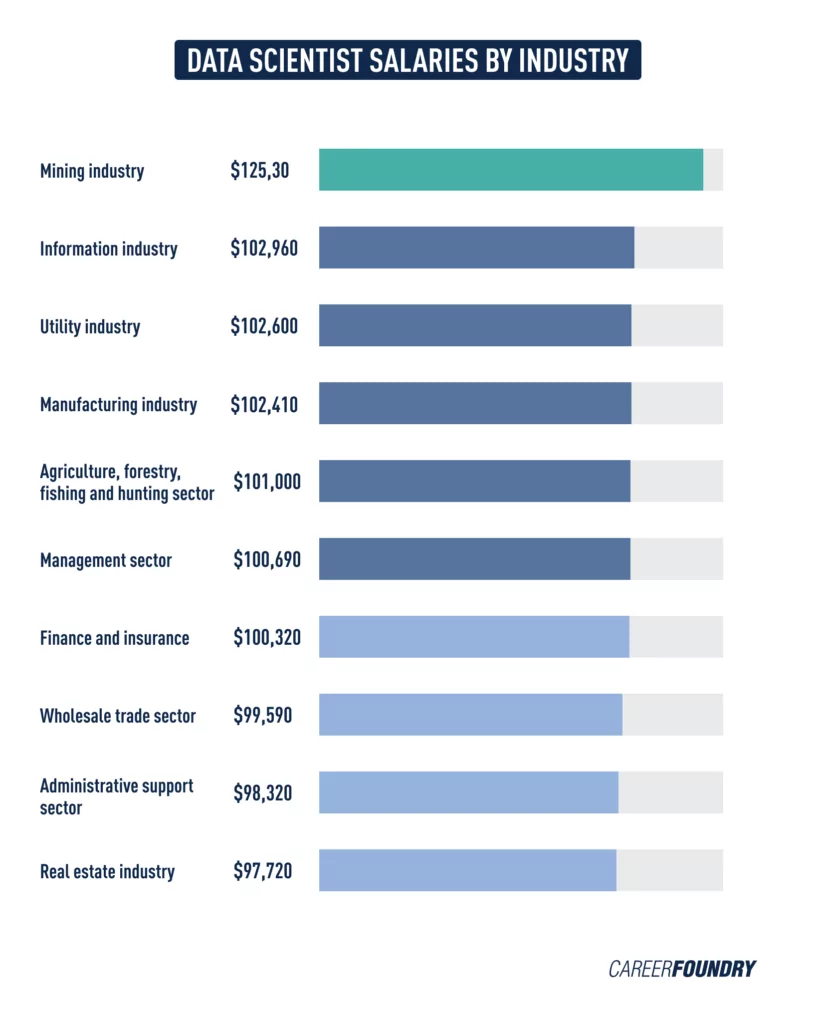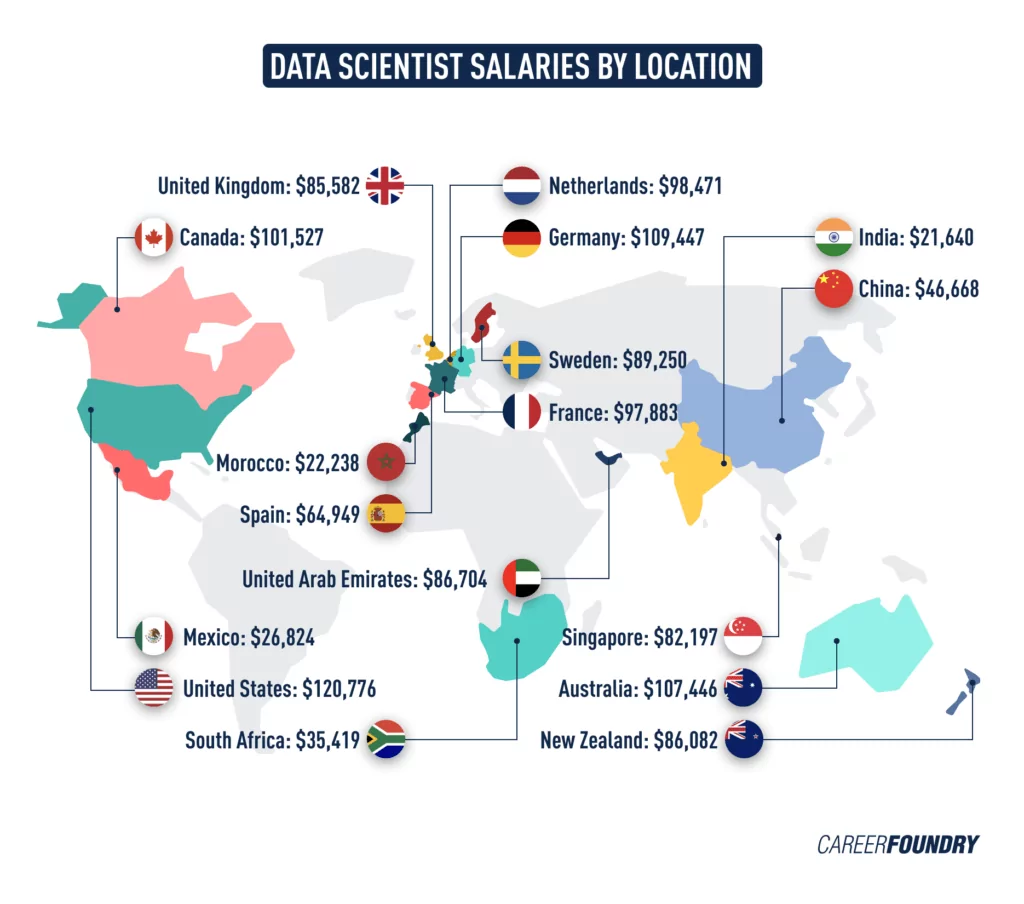How much can you make as a data scientist? Find out in this article.
So you’re pursuing a career in data analytics? Not a bad choice. Data analytics is a creative, diverse field, with excellent job security. It also provides tonnes of space for progression. One route that many data analysts take is into data science. This term incorporates a whole variety of different data-based activities, of which data analytics is just one.
One thing’s for certain—data scientists are in high demand. As you might suspect, then, the salary can reflect that.
In this post, we’ll look at how much is the average data scientist salary, based on their experience, job title, industry, and location. Whether you’re an established data analyst looking to take the next step, or simply want to see where the future might lead, this is the article for you. We’ll cover:
- What is the average data scientist salary?
- Data scientist salaries based on experience
- Data scientist salaries based on job title
- Data scientist salaries by industry
- Data scientist salaries by location
- Wrap-up and further reading
Ready? Then let’s dive into the numbers.
1. What is the average data scientist salary?
To get a handle on how much data scientists can earn, we turned to a few sources of information for an estimate. By our calculations, the average data scientist salary in the U.S. is about $118,140. Not bad at all, eh?
How did we get to that figure? Well, we took figures from 5 of the biggest salary sites and averaged them out. Here’s their own averages:
- The average U.S. data scientist salary according to Salary.com is $76,789
- The average U.S. data scientist salary according to Payscale is $99,645
- The average U.S. data scientist salary according to Indeed is $124,678
- The average U.S. data scientist salary according to Salary Expert is $132,873
- The average U.S. data scientist salary according to Glassdoor is $156,717
Of course, the real answer is not so straightforward. For starters, these figures are averages, taking into account the full range of possible salaries from inexperienced data scientists (who will earn less) to highly experienced ones (who can potentially earn a lot more).
How much you can earn depends on a variety of factors, including education and experience, industry, and location. Even the job title will have an impact. With all this considered, let’s delve a bit deeper into each of these variables and see what impact each can have on a data scientist’s pay.
Note: To keep things consistent, we’ll present all figures in US dollars. If you’re located outside the U.S., here’s a simple currency converter that you might find helpful.
2. Data scientist salary based on experience
Probably the most important factor determining a data scientist’s salary is their experience level. Logically, salaries mirror the skills and knowledge that the role requires. However, in a field as specialized as data science, your experience level is particularly important.
Furthermore, there are many routes into data science. Some data scientists come from academic backgrounds and may have a Ph.D. or Master’s in fields like computer science or statistics. Meanwhile, others progress up the career ladder in different ways. For instance, some start their career as data analysts or software developers, gradually obtaining invaluable industry knowledge that permits them to carve a niche role for themselves. All this will have an impact on how much you can earn.
Entry-level data science salary
Even entry-level data science positions pay a pretty comfortable salary. But if you’re quite new to the field, don’t expect to dive in at the deep end. According to Payscale, an entry-level data scientist in the US can expect to earn from around $62K, with an average salary of about $86K.
While this sounds quite high, be aware that a lack of hands-on experience will likely result in a salary on the lower end of this scale. Even in entry-level roles, higher salaries for data scientists generally presume some prior experience working in data analytics (or a similar profession) with knowledge of things like machine learning, statistical analysis, Python, and R all being essential. Other skills that can boost your salary prospects include knowledge of things like Scala (another programming language), deep learning, Apache Spark/Hive, and natural language processing (NLP). In short, the more skills you can gather, the more you’ll be able to earn. Something to aim for, then!
Mid-career data scientist salary
Obtaining the necessary skills and education to thrive in a data science role can present a steep learning curve. Luckily, the earning potential reflects this hard work. Payscale suggests that a mid-career data scientist in the U.S. can earn anywhere from $81K to $148K, with an average salary of around $111K. For mid-level roles, skills you might want to cultivate (on top of those already mentioned) include knowledge of cybersecurity, computer vision, and algorithm development. You will also probably need to pick up some more complex programming languages, like C++.
Late-career data scientist salary
According to Payscale, highly experienced data scientists in the US (with around 10+ years of experience) can earn an average of $137K annually, up to about $197K. Bearing in mind that this doesn’t take into account performance bonuses and other specialist skills, this is probably a conservative estimate. Highly experienced data scientists in top-paying industries (like finance or big tech) can earn upwards of $200K per year, if not more.

3. Data scientist salary based on job title
While the term ‘data scientist’ is a useful catch-all to describe a particular type of job, it’s important to bear in mind that not all data scientists have the same title. The variety of job titles (and the responsibilities that go with them) is broad, and usually (though not always) reflects a data scientist’s particular specialism.
In this section, we highlight salary expectations for a handful of different data science job titles, to give you a rough idea of how much different salaries tend to vary. Once again, to keep things consistent, all data has come from Payscale and is based on average salaries in the United States.
- Director of analytics. The average salary for a director of analytics is $130K. The key skills required for this role include data analysis, strategic planning, people management, big data analytics, and business intelligence.
- Machine learning engineer. The average salary for a machine learning engineer is $112K. Key skills include machine learning, deep learning, NLP, Python, computer vision.
- (Big) Data architect. The average salary for a big data architect comes in at $125K. Database architecture, database warehousing, business intelligence, data modeling, and SQL are some of the key skills you’ll need for this role.
- Data engineer. On average, data engineers earn $93K. Key skills include SQL, Extract, transform, load (ETL), data analytics, Apache Spark, Python. You can learn more about the role of a data engineer here.
- Business intelligence developer. The average salary for a BI developer is $83K. Key skills include business intelligence tools, Extract, transform, load (ETL), Tableau, SQL, and SQL Server.
- Web analyst. The average salary for a web analyst comes in at $69K. Web analysts are proficient in web analytics, data analytics, SQL, Google Analytics, and MS Excel.
- Research scientist. Research scientists earn, on average, $84K. Key skills for this role include product development, data analytics, biotech skills (or similar, relating to your field of expertise).
4. Data scientist salary data by industry

The most recent data we found for data science salaries by industry comes from the US Bureau of Labor Statistics. The data were collected in May 2021. Below, we’ve highlighted 10 of the top-paying industries in the United States:
- Mining industry: $125,300
- Information industry: $102,960
- Utility industry: $102,600
- Manufacturing industry: $102,410
- Agriculture, forestry, fishing and hunting sector: $101,000
- Management sector: $100,690
- Finance and insurance: $100,320
- Wholesale trade sector: $99,590
- Administrative support sector: $98,320
- Real estate industry: $97,720
Outside of the top-ranking industry—mining–you can see that the average salary across the top industries is pretty similar.
5. Data scientist salary data by location

The data we’ve provided so far is based on data science jobs in the United States. While the trends (experience, industry, and job title) can largely be extrapolated to different countries, the figures won’t be the same.
For those outside the United States (or considering a move elsewhere), we’ve collected data from Salary Expert, an analytics platform that collates data from around the globe. Salary Expert has slightly higher estimates than Payscale, and to reflect this, we’ve included the average United States data scientist salary in our list as a control.
The following countries’ average data scientist salaries are ranked on a scale from highest to lowest. For a clearer comparison, we’ve converted each figure into USD, but we encourage you to click through on each link for more details.
- United States: $120,776 USD
- Germany: $109,447USD (or €106,024)
- Australia: $107,446 USD (or $161,480 AUD)
- Canada: $101,527 USD (or $135,574 CAD)
- Netherlands: $98,471 USD (or €95,365)
- France: $97,883 USD (or €94,789)
- Sweden: $89,250 USD (or 951,756 kr)
- United Arab Emirates: $86,704 USD (or 318,466 د.إ.)
- New Zealand: $86,082 USD (or $141,424NZD)
- United Kingdom: $85,582 USD (or £72,521)
- Singapore: $82,197 USD (or $113,335 SGD)
- Spain: $64,949 USD (or €62,903)
- China: $46,668 USD (or ¥334,022)
- South Africa: $35,419 USD (or R617,270)
- Mexico: $26,824 USD (or $521,372 MXN)
- Morocco: $22,238 USD (or 238,416 د.م.)
- India: $21,640 USD (or ₹17,68,701)
Over the past few years of updating this data scientist salary comparison list, the United States has consistently remained at the top. While some of the reasons for this may be obvious (the big tech/MAANG companies are all located there, a higher cost of living in the areas that data scientists are likely to find work), in 2025 this may also be due to the economical changes that have lead to inflation, among other factors.
Working as a data scientist in Germany and Australia also consistently nets a salary on the higher end of this list. Since Salary Expert regularly updates its estimates, be sure to check through the links for the most up-to-date information.
6. Wrap-up and further reading
In this post, we’ve explored the average salary that data scientists can expect to earn based on different factors. As can be expected, variations arise depending on things like experience level, job title, industry, and location. However, even entry-level data scientists can expect to earn a comfortable living, while those with many years of experience can earn up to around $200K and potentially much more.
While skills and competencies are probably the single largest factor contributing to a good salary, developing these can be the start of an exciting data analytics journey that leads you along a fascinating and well-remunerated career path.
To learn more about some of the techniques you’ll need to flourish as a data scientist, try out this free introductory data analytics short course.
If you’d like to learn more about data analytics, check out the following:
